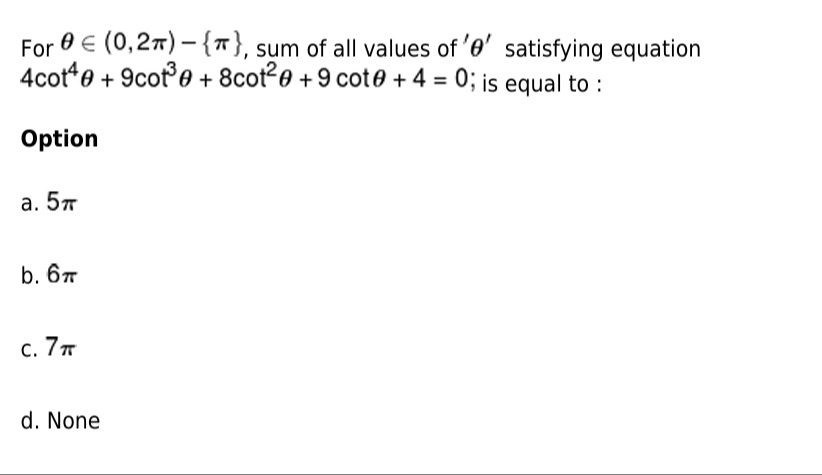Question
Question: For $\theta \in (0,2\pi) - \{\pi\}$, sum of all values of '$\theta$' satisfying equation $4\cot^4\th...
For θ∈(0,2π)−{π}, sum of all values of 'θ' satisfying equation 4cot4θ+9cot3θ+8cot2θ+9cotθ+4=0; is equal to :

5π
6π
7π
None
5π
Solution
The given equation is 4cot4θ+9cot3θ+8cot2θ+9cotθ+4=0. The domain for θ is (0,2π)−{π}. Let x=cotθ. The equation becomes 4x4+9x3+8x2+9x+4=0. This is a reciprocal equation. Since x=0 is not a root, we can divide by x2:
4x2+9x+8+x9+x24=0
4(x2+x21)+9(x+x1)+8=0
Let y=x+x1. Then y2=x2+2+x21, so x2+x21=y2−2. Substituting this into the equation gives:
4(y2−2)+9y+8=0
4y2−8+9y+8=0
4y2+9y=0
y(4y+9)=0
This gives y=0 or y=−49.
Case 1: y=0
x+x1=0⟹x2+1=0⟹x2=−1. x=±i. Since x=cotθ, and cotθ must be real for real θ, there are no real solutions for x in this case.
Case 2: y=−49
x+x1=−49
4x2+4=−9x
4x2+9x+4=0
This is a quadratic equation for x=cotθ. The discriminant is Δ=92−4(4)(4)=81−64=17. Since Δ>0, there are two distinct real roots for x. The roots are x1=8−9+17 and x2=8−9−17. Both roots are negative.
We need to find the values of θ∈(0,2π)−{π} such that cotθ=x1 or cotθ=x2. Since x1<0 and x2<0, the values of θ must be in the second or fourth quadrant. So, the solutions for cotθ=x1 in the given domain are θ1 and θ2=π+θ1. Similarly, the solutions for cotθ=x2 in the given domain are θ3 and θ4=π+θ3.
The sum of the solutions is S=θ1+(π+θ1)+θ3+(π+θ3)=2π+2θ1+2θ3=2π+2(θ1+θ3).
cot(θ1+θ3)=cotθ1+cotθ3cotθ1cotθ3−1=x1+x2x1x2−1. From the quadratic equation 4x2+9x+4=0, the sum of roots x1+x2=−9/4 and the product of roots x1x2=4/4=1.
cot(θ1+θ3)=−9/41−1=−9/40=0.
Since θ1,θ3∈(π/2,π), we have π/2+π/2<θ1+θ3<π+π, so π<θ1+θ3<2π. The general solution for cotϕ=0 is ϕ=nπ+π/2, n∈Z. We need π<nπ+π/2<2π, which leads to θ1+θ3=23π.
The sum of the solutions is S=2π+2(23π)=2π+3π=5π.
